- Home
- Joan Lowery Nixon
Playing for Keeps Page 3
Playing for Keeps Read online
Page 3
Petite Betty Norwich elbowed Mrs. Duncastle and whispered, “Eloise booked one of those big two-bedroom suites that cost a fortune. It’s up on the tenth deck.”
Mrs. Duncastle raised an eyebrow, but no one said anything. Neil looked away, studying the designs on the wall as if he hadn’t heard what had been said.
One of the elevators arrived nearly empty, and I thankfully joined the others, crowding inside.
Glory smiled at me and asked, “After lunch, while Eloise is resting, why don’t you and Neil explore the ship and see what fun things there are to do?”
I didn’t dare look in Neil’s direction. I was going to have to have a long talk with my grandmother.
“We may as well have lunch right away,” Mrs. Duncastle said. “That ship’s attendant who met us at the airport said it takes a long time to get all the baggage delivered to the staterooms, so we can’t unpack. Let’s just drop our carry-ons in our rooms and meet in the café.”
A few minutes later, as Glory and I stood outside the door of our stateroom, 7278, I said, “Glory, there are people everywhere to take care of your baggage and whatever you need. You didn’t really need me to come along to help you. Did you invite me to come on the cruise just to meet Neil?”
“Of course not,” Glory answered. “But it occurred to me when you were getting scolded about that party—and you should have been—that meeting a nice boy like Neil would be good for you.”
“Neil is a brain.”
“What’s wrong with being intelligent?”
“Nothing. Except I’m not in Neil’s league. He wouldn’t be interested in me. And I’m not interested in him or in all that stuff he knows—especially not all those statistics he rattles off.”
“Don’t be silly,” Glory said. She put her plastic card in the slot and opened the door. “Neil was only answering his grandmother’s questions.”
“She brags about him.”
“Of course she does. All grandmothers brag. I brag about you. Let’s go inside and take a look at our stateroom. We even have our own little balcony.”
As I stepped back to move out of Glory’s way, I heard a sharp intake of breath and realized I had stepped on someone’s foot.
“I’m sorry,” I said, regaining my balance. I quickly turned and saw Mr. Diago shutting the door of his interior stateroom, which was opposite ours.
“It is of no importance,” Mr. Diago said. He checked to make sure the door was locked. “These passageways are narrow.”
Realizing that Glory was watching from our doorway, I introduced Mr. Diago. Then I asked him, “Did you find your nephew?”
“My nephew?” For a moment Mr. Diago seemed flustered. “Oh, yes. Ricky. He is here on the ship.”
“Then I guess he got his jacket and made it back all right.”
“Of course.” He shrugged. “There was no need for concern.” He tipped his straw hat to Glory, said, “I am pleased to have met you,” and walked quickly down the passageway.
“Who is Mr. Diago? Where did you meet him?” Glory asked as soon as we entered the stateroom.
I didn’t answer for a moment. I was captivated by the beauty of our stateroom. The blues and grays seemed to draw in the sea and sky. Opposite me was a wall of glass with a sliding door that opened onto a private balcony. The stateroom was small and compact, but I loved it.
“Well?” Glory asked.
I hurried to answer. “He’s just someone traveling with his nephew.” I put the bags on the two twin beds. “I bumped into him, his nephew nearly knocked me down, and I stepped on his foot.” I giggled. “I hope we don’t continue meeting like that.”
Glory put an arm around my shoulders. “It’s past one o’clock, and we’re both starving,” she said. “Let’s join the others in the café and have lunch.”
A few minutes later, after I’d gone through the serving line and was seated between Glory and Neil—how had Glory managed to do that?—I noticed Mr. Diago seated at a nearby table against the wall. Most tables had been quickly filled, with seats taken the moment they became empty, and his table was no exception. But there was no sign of Ricky, not even an empty seat saved for him.
I knew from having read the preboarding instructions on the plane that this large café was the only place on the ship to get lunch before we sailed. The main dining room, the small specialty restaurants, and the fast-food diners and ice cream bars were closed for this first, informal meal on the ship.
I gave a quick glance to the heaped plate Neil had prepared for himself. It was a well-known fact that teenage boys were always hungry, so Ricky was bound to be. Mr. Diago was bent over his plate, looking as if he were concentrating on his food and nothing else. Where was Ricky? Obviously his uncle didn’t care.
I turned toward Neil, deciding to tell him about Mr. Diago’s odd behavior, but Neil was listening to Mrs. Duncastle. I heard her say, “My father never missed a major baseball game. If it wasn’t TV, then it was radio. I took in every game right along with him. So it was only natural, I suppose, that my late husband was also a baseball fan.”
“Did you follow the Cincinnati Reds?” Neil asked.
“Yes, but they weren’t my favorites.” She giggled and added, “Don’t ask me why, as a native west Texan, I rooted for the Minnesota Twins. I still remember 1965—before you were born—and the Cuban stars who brought the Twins the pennant— Tony Oliva, Sandy Valdespino, and Camilo Pascual. Pascual was one of the best pitchers in the majors.”
“Don’t forget Zoilo Versalles, a top shortstop with a great batting average.”
Mrs. Duncastle swallowed a large bite of potato salad and said, “Those Cubans really made a name for themselves. I still remember Cookie Rojas. He was with the Phillies and ended up managing the Angels in 1988.”
“There was another Cuban star—Martín Urbino,” Neil said. “Remember him? He was a good all-around player and went on to manage one of the Cincinnati Reds’ minor-league teams.”
“I remember Urbino,” Mrs. Duncastle said. “Stocky and strong. He had a lot of power behind that bat.”
“Take a look at the man facing us at the table next to the wall,” Neil said. “Doesn’t he look like Martín Urbino?”
Mrs. Duncastle put on her glasses and leaned forward. “Where?” she asked.
Neil turned to point him out. I looked too, but Mr. Diago was no longer there. A young blond woman sat in the chair where he had been. She was eating and chatting with the woman next to her.
“I guess he left,” Neil said. “Well, it doesn’t matter. If I see him later, I’ll point him out to you.”
As Neil and Mrs. Duncastle went back to discussing baseball, I turned to Glory on my other side. But she was busy listening to a detailed complaint from Myra Evans about her son-in-law.
I finished my salad, my thoughts on Mom. They were bound to have postcards on the ship. I’d send one to Mom, just to let her know I was thinking about her. To say I was sorry we’d parted on such unhappy terms. To say . . . I put my napkin on the table and began to slide my chair back.
I was about to excuse myself when a tall, muscular man who was probably in his mid-sixties stopped behind my chair, blocking my way.
“Dora?” he asked Mrs. Duncastle in a voice so deep it sounded like the voice of a bear in a Saturday-morning cartoon. “Is it really you?”
Mrs. Duncastle turned, looking up with surprise. She beamed, a tiny speck of broccoli decorating her smile. “Anthony Bailey!” she said, grasping his hand. “I haven’t seen you since Fred and I had dinner with you at that builders’ convention in Las Vegas.”
“How is your husband?”
“Oh, Fred’s fine. Enjoying retirement.” Without letting go of Mr. Bailey’s hand, Mrs. Duncastle introduced him to everyone at the table and giggled. “I was so impressed because Anthony was staying in the Las Vegas hotel’s presidential suite.”
He tried to look modest but didn’t make it as he said, “This time it’s the royal suite—top of the line.”
“Oh, my,” Mrs. Duncastle said, sounding impressed all over again. Then she asked Mr. Bailey, “Are you on board for the bridge tournament?”
He laughed. “No. Bridge is not my game. To my way of thinking, playing cards for fun, as you once put it, is a waste of time.”
“I hope you’re kidding,” Glory began, but Mr. Bailey interrupted her by holding up his free hand.
“Ladies, I own a company that builds and operates casinos. You can see why I said what I did.” He laughed in a low rumble, and some of the women smiled in return.
“Do you manage the casino on this ship?” Mrs. Duncastle asked.
He shook his head. “No, but my associates and I have been discussing the possibility of establishing cruises exclusively for gambling. Excursions in various ports would also be connected to casinos. This is not strictly a pleasure trip for me, since I’m on this cruise as an observer.”
Neil swiveled in his chair so that he could look up at Mr. Bailey. “How many Caribbean ports besides Havana have gambling casinos?”
“Not enough,” Mr. Bailey answered. “But it’s a problem my company can easily remedy, given the right cooperation. As for Cuba, I’ve already made initial contact with authorities in Castro’s government. Eventually, when the tourist trade with the United States is fully restored, I hope to get permission to build and develop a Havana casino that will put any Vegas casino in a backseat.”
“Do you enjoy gambling, Mr. Bailey?” Alicia Carver asked.
Neil spoke before Mr. Bailey could answer. “In any casino the odds are always in favor of the house,” he said. “I could give you statistics, but Mr. Bailey probably knows them. I’m sure he doesn’t gamble.”
Mr. Bailey chuckled. “Only on a sure thing, kid,” he said. “I make it a point never to pass up a sure thing.”
He pulled his hand from Mrs. Duncastle’s grip and patted her shoulder. “I look forward to seeing you and your friends again on this trip,” he said.
Mrs. Duncastle gave him time to leave the café, then said, almost purring, “Anthony is such a nice, friendly person.”
“Handsome, too,” Mrs. Applebee said. “Did you notice that the polo shirt he was wearing matched the blue of his eyes?”
“I think he was flirting with you, Dora.” Mrs. Carver giggled.
“Nonsense,” Mrs. Duncastle said, but she giggled too.
“What’s so funny?” Mrs. Fleming asked as she adjusted her hearing aid. “And who was that man?”
“Dora’s good-looking boyfriend,” Glory answered, and all the women laughed.
I couldn’t take any more of their silliness. It was embarrassing to hear grandmothers talking about boyfriends. “Please excuse me,” I said, pushing back my chair. “I have to buy a postcard.”
Glory leaned forward. “Neil, why don’t you go with Rosie? I’ll take Eloise to her stateroom and see that she’s comfortable. That will give you two a chance to look over the ship.”
The back of Neil’s neck turned red as he said, “No thank you, Mrs. Marstead. Maybe some other time, but I promised Grandma I’d look out for her, and I’d feel better about it if I stayed with her at first.”
Was every guy I met going to reject me? Uncomfortable because all the women were watching, I quickly said, “It’s okay, Glory. I’ll see you soon. Excuse me, please.” I strode away from the table to the nearest elevator bank. I’d go to the desk on deck five, where I could probably get a postcard with a picture of the ship.
A girl with long brown hair was the only occupant of the elevator. She wore a sheer pale blue blouse over a white tank top and shorts. I wish I looked that cool, I thought. “Hi,” the girl said as I got in.
“Hi,” I answered automatically.
“Are you going to Star Struck?” She pulled her I.D. card out of her blouse pocket, examined it, then put it back.
I shook my head. “No, I’m going to deck five.” It suddenly dawned on me what she had said, and I asked, “What’s Star Struck?”
“It’s the hangout they’ve got on board for teenagers. It’s on deck twelve.”
“Don’t tell me,” I said, and made a face. “Crafts and other so-called fun stuff designed to keep us busy.”
“No. It’s not like that. It’s a cool place. And almost every night there’s a band with some pretty good music.”
The elevator doors began to close. The girl took a step forward, then paused, brushing back her hair. She let the door close again. “Never mind. I’ll ride down to five with you,” she said. “My name is Julieta Vargas.”
“I’m Rosie Marstead,” I answered.
“Sixteen? Seventeen?”
“Sixteen.”
“Me too.” Julieta leaned back against the elevator wall and sighed with relief. “I’m glad you’re aboard. I’ve been wandering around looking, but I’ve only met thirteen- and fourteen-year-olds so far.”
The elevator stopped at deck five, and I said, “Here’s where I get out.”
“Are you going shopping? Mind if I go with you?”
“Sure.” I smiled, feeling much better. Here was someone my own age who wanted to be friends. I didn’t need Neil, and—no matter what Becca had predicted—I wasn’t looking for romance.
At the desk I asked for a postcard of the ship, bought a stamp for it, then tried to think of a quick message that would fit. I needed to write something that would tell Mom exactly how I felt and how much I really loved her.
Julieta watched, impatiently shifting from one foot to the other, but I tried not to let it bother me. I thought hard, but what could I really say on a postcard, open for anyone to read? I finally wrote, Dear Mom, This is a beautiful ship. I wish you were here. I love you. Rose Ann.
It wasn’t what I’d hoped to write, but it would do. I’d write another postcard later, when I had time to really think about what to say. I dropped it into the ship’s mailbox and walked with Julieta into the mall.
“When the ship sails at five, there’ll be a calypso band on deck eleven, by the outside swimming pool,” Julieta said. “They’re having a bon voyage party.”
“How do you know all this?” I asked. We stepped into a shop that had racks of jackets, sweat-shirts, and T-shirts—all with the ship’s name and logo on them.
“How do I know all this?” Julieta shrugged. “My parents and I live in Miami, so we go cruising every year. By now I’ve learned the drill.” She bent over a jewelry counter. “Pretty,” she said, pointing to some twisted gold costume-jewelry rings.
But what caught my eye were pendants—silver replicas of sunken treasure edged in gold. “How much?” I asked the woman behind the counter. I knew Mom would love one of those.
“The small ones are thirty-five dollars,” the woman answered. “They go up in price according to size. Each comes with a certificate.”
“Thanks,” I said, and turned away. Thirtyfive dollars? That would be nearly all my spending money.
I spotted Mr. Diago at the far end of the shop buying a navy blue T-shirt. Ricky still wasn’t with him. “Julieta,” I said, “if you know a lot about cruising, then you’ll know the answer to this. Could anyone get lost on board this ship?”
“Lost like you don’t show up for dinner on time, because you’re still in the pool?”
“No. I mean lost period. Like no one would know if you were on the ship or not.”
“A stowaway? I don’t think so. No one gets on board without an identification card, and there are security people all over the place.”
“I didn’t mean like a stowaway,” I said.
Julieta tilted her head and studied me with a puzzled look on her face. “Well, what did you mean?”
“I don’t know,” I said. “I’ve never been on a cruise ship before, and I suppose I was just thinking about how big this ship is.” I didn’t want to tell Julieta about Mr. Diago. I didn’t know her well enough. I wasn’t even sure what I was suspicious of yet. I wished Becca were on board to talk to.
Julieta and I vis
ited all the shops on the promenade, stopping to refuel at the serve-yourself ice cream bar.
We were just finishing our cones when we heard an announcement that everyone aboard ship was required to be at their proper station for the compulsory lifeboat muster.
“As soon as it’s over, meet me on deck eleven so we can hear the calypso band while we sail out of the harbor,” Julieta said.
“Okay,” I answered. My heart beat faster with excitement. We were almost ready to sail! I hurried to our stateroom and saw that only one of the bright orange life jackets was still on the bed. Glory was probably already wearing hers.
I read the instructions, pulled on the bulky life jacket, and hurried to our assigned station on deck four, where the crowd of passengers searching for their places on deck moved like a swarm of fat orange bees.
For a moment I remembered the terrible scene in Titanic when people scrambled for lifeboats and there weren’t enough places, and Rose Calvert and Jack Dawson . . . I groaned. The last thing I wanted—or would ever get—was a gorgeous Jack Dawson. And anyway, Rose and Jack didn’t live happily ever after.
I paused in the doorway to the outer deck, looking for Glory, and overheard someone grumble, “I haven’t got time for this rubbish. I should be on deck eleven setting up. Nobody told me there was going to be so much to do.”
I glanced to one side, where a lean, blond man wearing gray slacks and a light blue polo shirt was struggling to strap on his life vest.
The pretty young woman next to him, wearing the ship’s uniform, raised one eyebrow. “Don’t tell me this is your first job as a cruise director, Tommy.”
Tommy stopped and scowled. “I’m a last-minute sub, okay? Your company’s VP had to take whoever he could get. Your regular cruise director should have picked a more convenient time to fall off the stage and break his arm.”
The woman laughed. “Poor Jerry. And poor Tommy. All week you’ll be on energy overload, and you won’t get much sleep.”
“Thanks for the encouragement,” he grumbled. “If Broadway hadn’t been totally dead for comedians this season, I would have turned this gig down.”
“Where on Broadway would you get the chance to lead a group of six-A.M. joggers around the top deck each morning?” She looked as if she was enjoying the conversation, and I wondered if this last-minute cruise director wasn’t too popular with the rest of the crew. What could be worse than a comedian with no sense of humor?

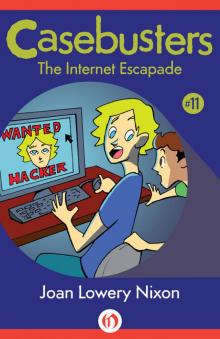 The Internet Escapade
The Internet Escapade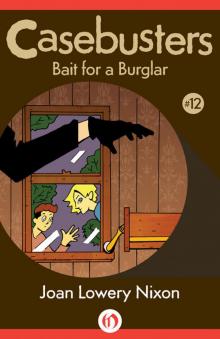 Bait for a Burglar
Bait for a Burglar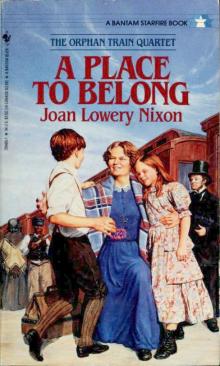 A Place to Belong
A Place to Belong Nightmare
Nightmare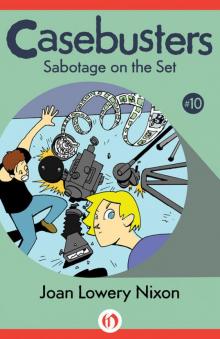 Sabotage on the Set
Sabotage on the Set The Other Side of Dark
The Other Side of Dark Whispers from the Dead
Whispers from the Dead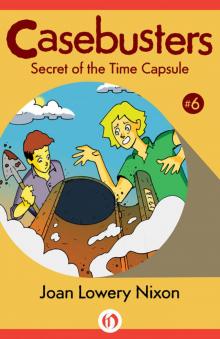 Secret of the Time Capsule
Secret of the Time Capsule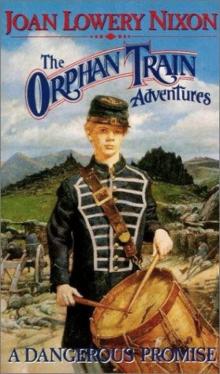 A Dangerous Promise
A Dangerous Promise Laugh Till You Cry
Laugh Till You Cry Spirit Seeker
Spirit Seeker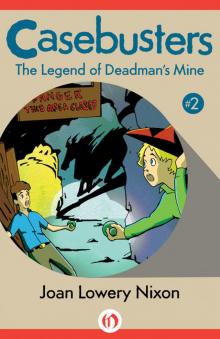 The Legend of Deadman's Mine
The Legend of Deadman's Mine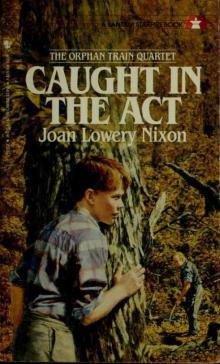 Caught in the Act
Caught in the Act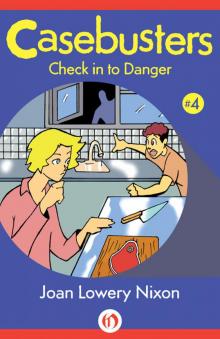 Check in to Danger
Check in to Danger Ellis Island: Three Novels
Ellis Island: Three Novels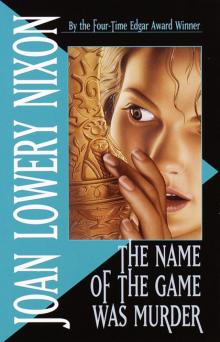 The Name of the Game Was Murder
The Name of the Game Was Murder The Haunting
The Haunting Lucy’s Wish
Lucy’s Wish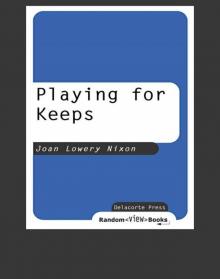 Playing for Keeps
Playing for Keeps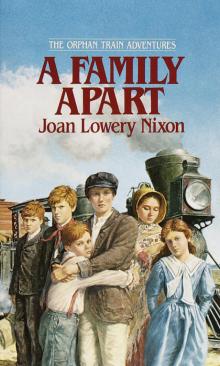 A Family Apart
A Family Apart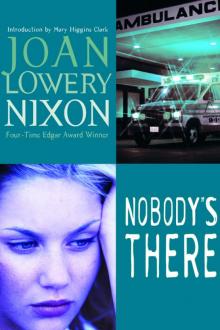 Nobody's There
Nobody's There Shadowmaker
Shadowmaker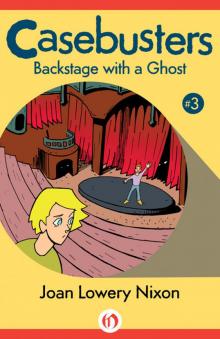 Backstage with a Ghost
Backstage with a Ghost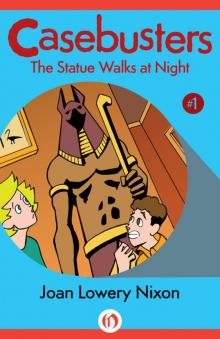 The Statue Walks at Night
The Statue Walks at Night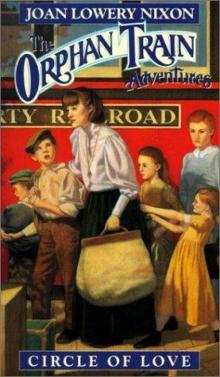 Circle of Love
Circle of Love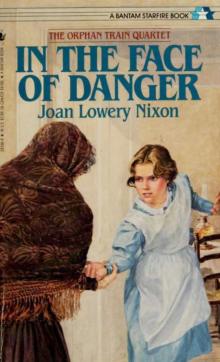 In the Face of Danger
In the Face of Danger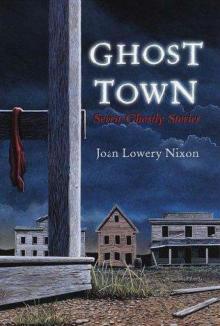 Ghost Town
Ghost Town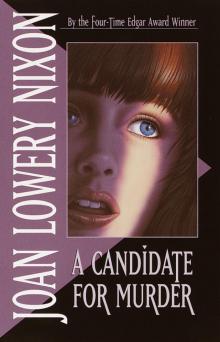 A Candidate for Murder
A Candidate for Murder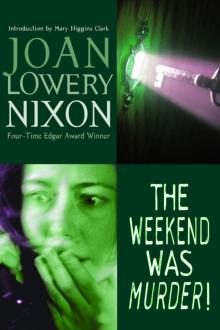 The Weekend Was Murder
The Weekend Was Murder The Island of Dangerous Dreams
The Island of Dangerous Dreams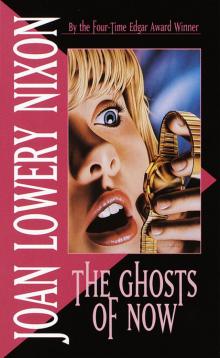 The Ghosts of Now
The Ghosts of Now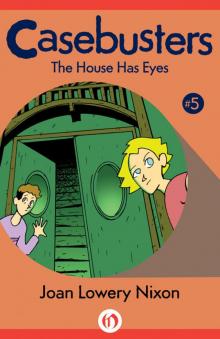 The House Has Eyes
The House Has Eyes The Dark and Deadly Pool
The Dark and Deadly Pool Keeping Secrets
Keeping Secrets Secret, Silent Screams
Secret, Silent Screams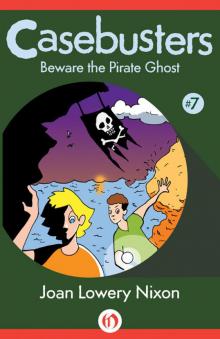 Beware the Pirate Ghost
Beware the Pirate Ghost Search for the Shadowman
Search for the Shadowman Haunted Island
Haunted Island